Suburbia is a tile-laying, city-building game.
Title: Suburbia
Year Published: 2012
Designer: Ted Alspach
Publisher: Bezier Games
Players: 1-4
Game Time: 90+ Mins
Set-up Time: >5 Mins
Ages: 8+
Theme: Modern Day
Mechanic: Tile Laying
How to win: Have the largest population
Game Description
Plan, build, and develop a small town into a major metropolis. Use hex-shaped building tiles to add residential, commercial, civic, and industrial areas, as well as special points of interest that provide benefits and take advantage of the resources of nearby towns. Your goal is to have your borough thrive and end up with a greater population than any of your opponents.
How to play Suburbia (Second Edition)
Suburbia Set Up
Place the Population Board, Stack board, Supply board and Real Estate board on the table.
Shuffle the Stack A tiles depending on the player count and place them on their spot on the Stack board. After, do the same for Stack B then C but make sure to place the “Last Turn” tile in Stack C.
The top 7 tiles form Stack A are placed along the bottom edge of the Real Estate Board.
Place 4 Heavy Factory, 4 Community Park and 4 Suburb tiles on their spaces on the Real Estate Board.
Place the money on the Supply Board.
Shuffle the goals and place one random goal face up on their space on the Real Estate board and deals 2 face down to each player.
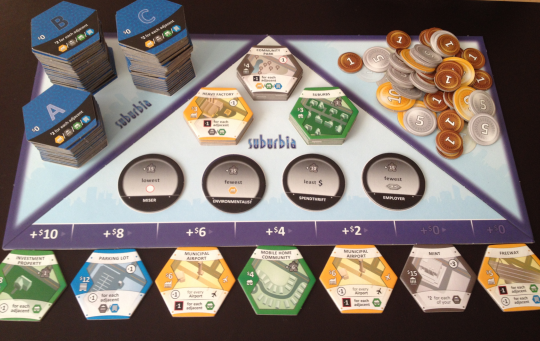
Player Setup
Give each player a Borough Board, Income Cylinder, Population Square, Reputation Cube and Investment Markers of their colour along with $15 million. The player places their Income Cylinder, Population Square and Reputation Cube in their relevant place. They place a Suburb, Community Park and Heavy Factory on their Borough Board.
They will choose one of their secret goals to keep and discard the other.
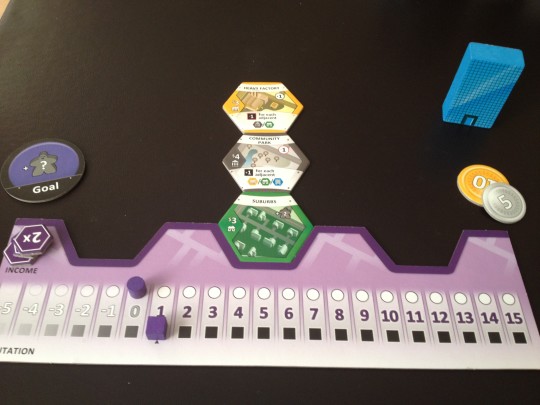
Determine a start player and give them the Start Player Marker.
Suburbia Game Play
Starting with the Start Player each player MUST take 1 of the following actions on their turn…
1 – Take a tile from the Real Estate Market
Take the tile, pay the cost plus the cost on the Real Estate market.
Place the Tile in the Borough adjacent to any other tile.
Adjust Income and Reputation.
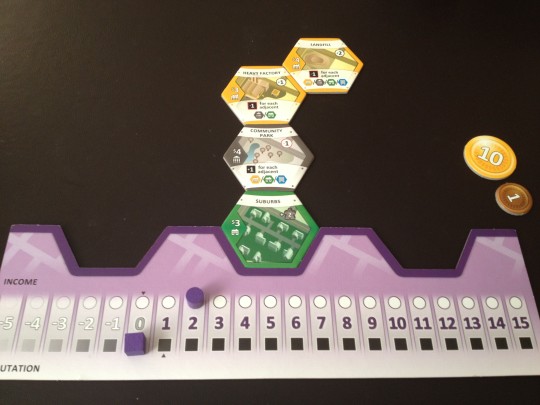
2 – Take a Basic Tile
Take a Suburb, Community Park and Heavy Factory tile and pay the cost.
Remove a tile from the Real Estate market from the game, paying only the cost on the Real Estate Board.
Place the Basic Tile in the Borough adjacent to any other tile.
Adjust Income and Reputation.
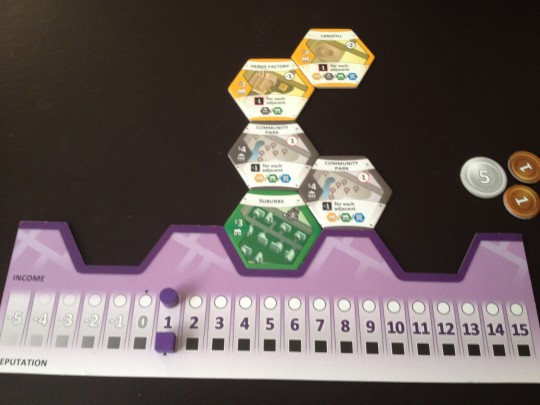
3 – Create a Lake
Take any tile from the Real Estate Market, paying only the on the Real Estate Board.
Turn the tile over to show the Lake side and place it in the Borough adjacent to any other tile.
Take $2 million per adjacent relevant tile.
Adjust Income and Reputation.
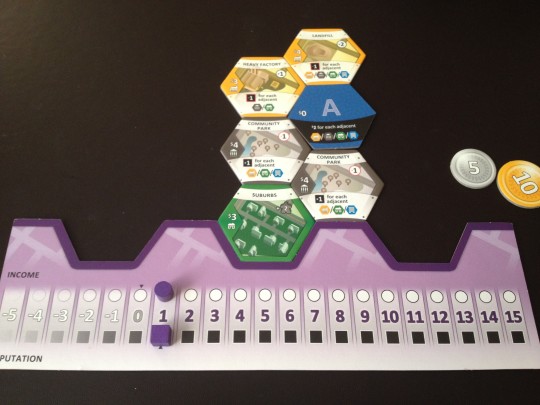
4 – Place an Investment Marker
Choose a tile in your Borough, pay the cost of that tile to the bank and place an Investment Marker on it.
Remove a tile from the Real Estate market from the game, paying only the cost on the Real Estate Board.
Adjust Income and Reputation.
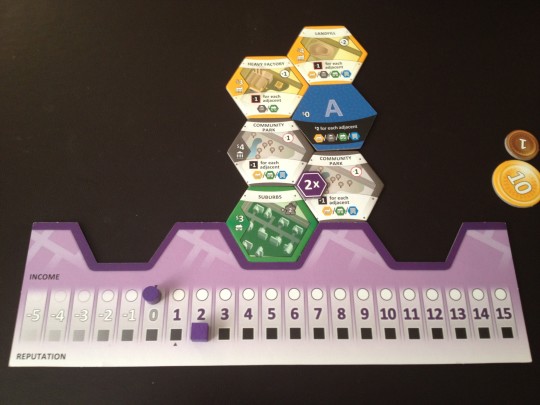
Resolve Income
Gain money equal to your income or pay that amount if your income is in negative figures.
For each $1 million that is unpaid, the player will lose 1 Reputation. However, if they don’t have any Money or Population, this remains at 0.
Adjust Population
Increase your Population a number of spaces equal to your Reputation. You must pay $1 million per 1 Population you lose if you are on 0. If you have no Money or Population, this remains at 0.
If your rise in Population causes you to cross 1 or more red lines on the Population board, reduce your Income and Reputation by 1 for each line you crossed.
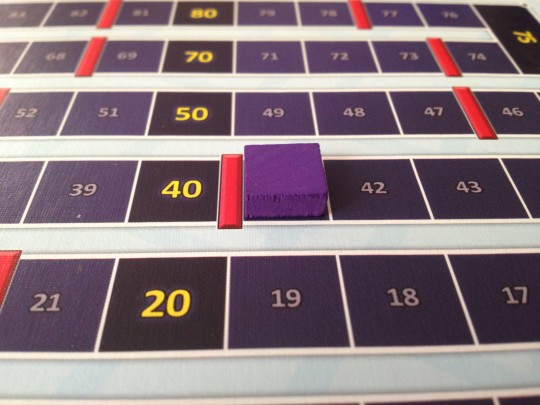
Adjust the Real Estate market
Slide the tiles on the Real Estate Market down to fill the gap and place the next tile from the stack onto the end.
Play continues to the left.
Game End
When the “1 More Round” tile from Stack C is revealed, play goes around to the start player then each player takes 1 last turn.
The player who has ‘won’ any of the Goals on the Real Estate market gains that much Population. In the case of a tie, no player will gain this bonus.
Each player reveals their secret goal in turn order and scores them in the same way with only the owner of the goal able to score points.
Each player gains 1 Population for every $5 they have left.
The Highest Population wins but there are 4 tie breakers:
1 – Highest Reputation
2 – Highest Income
3 – Most Money
4 – Play another game of Suburbia to break the tie, according to the rulebook that is!
Suburbia Round-Up
So Suburbia looks drab and sounds dull but it’s really really good.
Balancing your money, income and reputation while keeping on eye on what you have, one eye on what your opponents have and erm… another eye on what’s coming up is challenging yet lots of fun.
Every turn you move up the Population board and most turns your income drops so you are always thinking about how you can improve what you have and how you can increase your income again.
Thematically it works really well. Airports get more valuable the more Airports there are. (What’s an Airport without a destination?) Building next to a Landfill lowers your reputation. A community park increases your reputation but the cost to keep it looking nice lowers your income.
A solid theme and a very good game.
Suburbia Collectors Edition Ups & Downs
Suburbia Rating
Since the end of my first play, Suburbia has been one of my Favourites.
I give this 9/10
This game is a member of my Board Game Hall of Fame!
Suburbia Initial Review June 2013
It’s quite math-y and won a Mensa award but how does it play?
Sim City in a box? Yeah, I think so.
Overview
The goal is to build a ‘Suburb’ and have the largest population at the end of the game. You start with a small area containing a residential Suburb, a Community Park and a Heavy Factory.
Where a new tile is placed on your board has an impact on neighbouring tiles, other tiles in your area and sometimes tiles in other people’s areas.
For example, building a factory next to a residential area reduces your reputation whereas a Community Park next to a residential area raises it… makes sense right?
Having your tiles affect and be affected by other players is really cool. For example, your Airport, on its own, isn’t that great. But ANY other Airport that is built for the rest of the game makes your Airport more valuable… again, it makes sense.
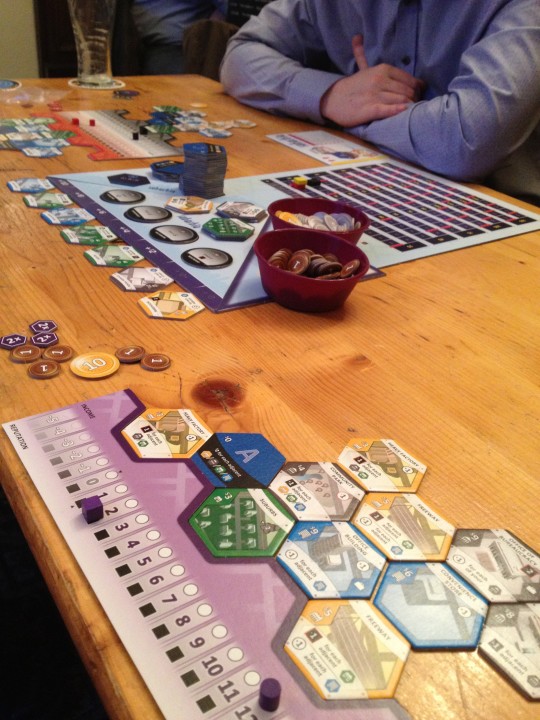
This is a very very good game and I’m very keen to play it again.
Jesta ThaRogue

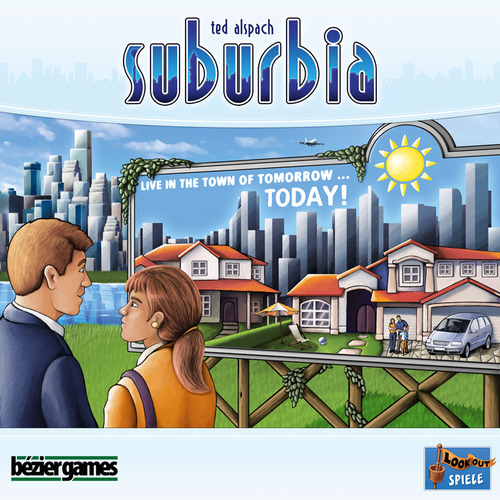
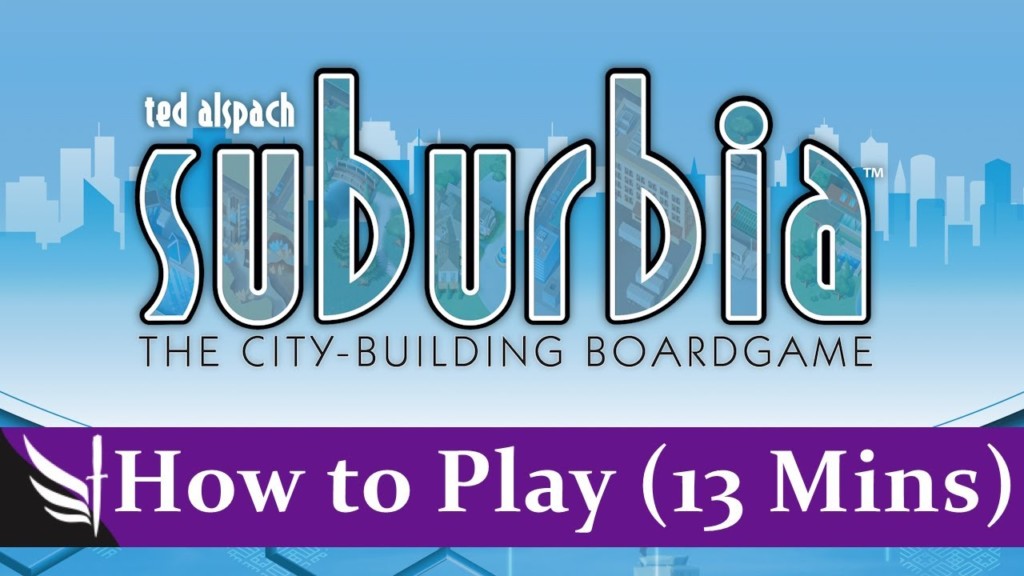
Leave a Reply